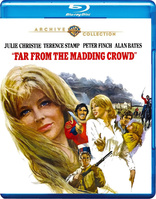Far from the Madding Crowd Blu-ray Movie
HomeFar from the Madding Crowd Blu-ray Movie 
Warner Archive CollectionWarner Bros. | 1967 | 171 min | Not rated | Feb 10, 2015
Movie rating
7.4 | / 10 |
Blu-ray rating
| Users | 0.0 | |
| Reviewer | 3.0 | |
| Overall | 3.0 |
Overview
Far from the Madding Crowd (1967)
A 19th Century Englishwoman inherits a farm and is loved by three very different men: a handsome and wayward soldier, a neighboring land owner and an ever-patient shepherd. From the novel by Thomas Hardy.
Starring: Julie Christie, Terence Stamp, Peter Finch, Alan Bates, Prunella RansomeDirector: John Schlesinger
| Romance | 100% |
| Period | Insignificant |
| Drama | Insignificant |
Specifications
Video
Video codec: MPEG-4 AVC
Video resolution: 1080p
Aspect ratio: 2.41:1
Original aspect ratio: 2.35:1
Audio
English: DTS-HD Master Audio 5.1 (48kHz, 24-bit)
Subtitles
English SDH
Discs
50GB Blu-ray Disc
Single disc (1 BD)
Playback
Region A, B (C untested)
Review
Rating summary
| Movie | 2.5 | |
| Video | 4.5 | |
| Audio | 3.0 | |
| Extras | 1.0 | |
| Overall | 3.0 |
Far from the Madding Crowd Blu-ray Movie Review
Intimate Epic
Reviewed by Michael Reuben February 9, 2015I don't know whether Thomas Hardy's novels are still as common in today's test-anxious classrooms as when I attended high school, but I hope not. He's a great novelist, but his subject matter requires an adult perspective (or, at least, an adult's experience). Hardy's characters live, toil, suffer and frequently die in fictional Wessex, England, an isolated rural county of the late 19th Century, where everybody knows you, choices are few, and your lot in life is set by the circumstances into which you are born. It's hard enough for an American of the 20th or 21st Century to make the imaginative leap into that world. For an adolescent, it's almost impossible. (Leave aside the challenge of the densely layered prose.) Hardy often used female protagonists, because their choices were even more limited than those of the men around them; a moment's carelessness could leave them permanently outcast from society, with no way to support themselves other than begging or prostitution. But in Hardy's fourth novel, Far from the Madding Crowd, he created an unusual heroine who appeared to gain her freedom when she inherited a large farm and thereby became financially independent. Surely this was a woman who could direct her own destiny. As Hardy then charts, the woman's independence is illusory, because not only the world around her, but also her emotions are still controlled by men in ways that she barely comprehends. Hardy named his heroine "Bathsheba", after the Old Testament beauty whose appearance so bewitched King David that he incurred the Lord's wrath by seducing her, then arranging for her husband's death. In the late 1960s, with the studio system on life support, MGM managed to convince itself that Hardy's intimate story of Bathsheba and the three men who desire her could support a screen epic on the scale of Lawrence of Arabia or Dr. Zhivago. They agreed to co-finance a film version starring one of Zhivago's stars, Julie Christie, in the central role of Bathsheba with a trio of fine English actors playing her three suitors. The director was John Schlesinger, who had recently directed Christie to an Oscar in Darling (1966) and would win one himself a few years later for Midnight Cowboy (1970). The production shot on location in the picturesque area of Dorset, which was the model for Hardy's Wessex. Released in October 1967 at nearly three hours in length, Madding Crowd was well received in England but bombed in America. I remember seeing it with the same high school class that had been force-fed the novel, and it was hard to say which felt more interminable. Today I look at the film differently, but it remains a flawed work, even in this magnificent Blu-ray presentation from the Warner Archive Collection.
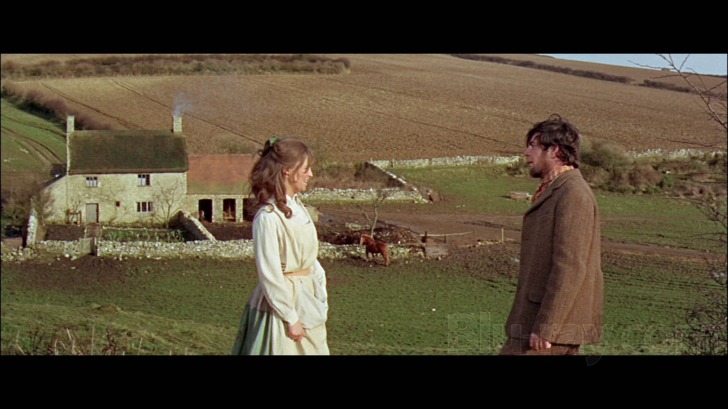
Of the three suitors of Bathsheba Everdene (Christie), the first is a shepherd and farmer named Gabriel Oak (Alan Bates), whose last name is meant to tell you a lot about his character. He falls in love with the young beauty while she is staying with her aunt, Mrs. Hurst (Alison Leggatt), but she refuses his proposal because she doesn't love him. Shortly after, Bathsheba departs from her aunt's home, and Gabriel suffers a ruinous loss on his farm that leaves him broke and looking for work. (His first reaction is to be thankful that he isn't married with a wife to support.) By a fateful coincidence, Gabriel finds work at a farm that Bathsheba has inherited from her late uncle and which she has now decided to run herself, having fired the previous bailiff (as the head man is called) for thievery. The servants, the workers and the local town are buzzing with gossip at the news that a woman is attempting to run a farm. The development also attracts the attention of a respected neighboring landowner, William Boldwood (Peter Finch, Network), renowned for both his business sense and his bachelorhood. In an ill-considered fit of playfulness, Bathsheba sends Boldwood a valentine, but what she doesn't know is that she's already caught his eye. Encouraged by the greeting, he proposes to her, but receives the same response as Gabriel: that she doesn't love him. Still, a wealthy and successful man like Boldwood is not someone to give up after only one attempt. Bathsheba's third suitor does not begin by proposing marriage. Sergeant Frank Troy (Terence Stamp) is a soldier in Queen Victoria's service and a ladies' man. His current lady is Fanny Robin (Prunella Ransome), a servant in Bathsheba's home, whom Frank has promised to marry. One senses from Frank's bearing that there have been many like Fanny. When he meets Bathsheba by chance, he handles the encounter with the ease of an accomplished flirt. The sequence in which Frank seduces Bathsheba by thrilling her with a display of swordsmanship is one of Madding Crowd's most stylish, with its use of odd camera angles and unusual editing rhythms. To Bathsheba, as to other women, Frank represents adventure and excitement. What she feels may not exactly be love, but it is powerful and irresistible. The emotional dynamic among Bathsheba and her three would-be lovers takes several unexpected turns as it builds to an explosive conclusion, but this is hardly a tale that needs three hours of screen time. Schlesinger and screenwriter Frederic Raphael (Eyes Wide Shut) attempt to make Madding Crowd a pastoral epic by routinely isolating the characters in vast empty landscapes, emphasizing their remoteness from the "madding crowd" of England's bustling cities. But the effect is the opposite of what Hardy intended when he took the novel's title from a line in Thomas Gray's Elegy Written in a Country Churchyard. Gray meant to celebrate simple country life, whereas Hardy's point was that there was nothing simple about it. Schlesinger and Raphael attempt to convey this element of the novel through elaborate recreations of 19th Century rural activity: negotiating prices for seed at the town's exchange, planting, harvesting, nursing herds of sheep through bouts of disease, country fairs, even a traveling circus. While these scenes are well-done and interesting, they are no substitute for the one thing missing from the film, which is Bathsheba's inner life as she struggles to sort out her feelings toward the three men pursuing her and her responsibilities as a landowner. Her often impulsive actions are what drive the plot, and without insight into the source of those impulses, the plot becomes a series of arbitrary events. Julie Christie remains an enchanting screen presence, although, for some unknown reason, the production felt it necessary to soften many of her closeups as if she were an aging star (she was 26 at the time). But even the greatest actor cannot supply a central character that hasn't been written, and Christie's Bathsheba remains baffling and opaque throughout most of Madding Crowd. To the extent she seems to have traced a character arc by the end of the film, it isn't because she knows herself or the world any better; it's simply that she no longer has the choices she had when she started. Several sequences stand out as especially memorable. In addition to the sword seduction already mentioned, the early scene in which Gabriel loses his flock is grim and unsettling. A later sequence involving a fire on Bathsheba's farm captures the chaos and panic of an out-of-control blaze, and a scene in which Gabriel and Bathsheba attempt to cover vulnerable haystacks against a rapidly advancing storm looks frighteningly authentic. But these set pieces amount to no more than eye candy; they're the equivalent of CGI "money shots" in a contemporary film. When it comes to understanding Bathsheba, these scenes are dramatic filler.
Far from the Madding Crowd Blu-ray Movie, Video Quality 

Far from the Madding Crowd was shot in anamorphic Panavision by cinematographer Nicolas Roeg, who would later become the director of such visually memorable films as Don't Look Now and The Man Who Fell to Earth. Warner first released the film on DVD in 2009 in this extended version containing three additional minutes, and this is presumably the same transfer, since the studio would already have been looking toward an eventual release on Blu-ray. The Warner Archive Collection's 1080p, AVC-encoded Blu-ray is a stunning reproduction of Roeg's widescreen photography. In the many long shots showing the vastness of the Wessex landscape, the tiny figures of the characters are so crisply defined that the quality puts Blu-rays of many films of more recent vintage to shame. In closeups and medium shots, the extent of the detail in the period costumes and decor, in the very muck and grime on the ground, is so remarkable that just admiring the production design has entertainment value. One can even make out the steamy breath of the parishioners sitting in an unheated church singing hymns. The palette favors earth tones, with added grays and blues for the sky, where the sun rarely shines. The brightest color is typically red, which is the color of Frank Troy's uniform and generally appears in one form or another when Frank is around or Bathsheba is thinking of him. Consistent with WAC's usual practice, Madding Crowd has been mastered with a high average bitrate of 30.50 Mbps, which ensures good quality and keeps artifacts at bay.
Far from the Madding Crowd Blu-ray Movie, Audio Quality 
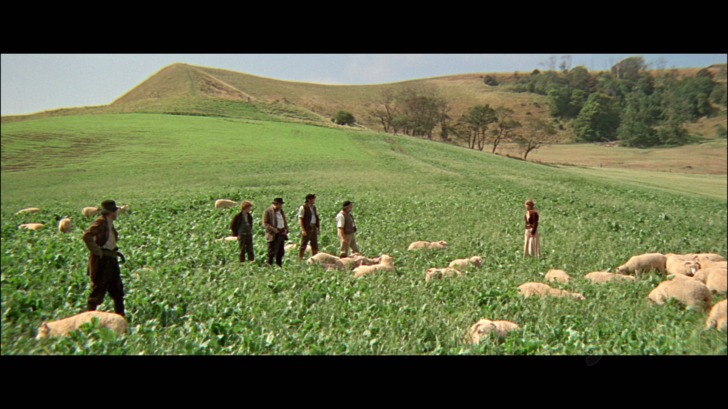
Far from the Madding Crowd was released with a mono track for 35mm prints and with a six-track mix for a 70mm blow-up. No information was provided about the source used for the 5.1 remix encoded on WAC's Blu-ray in lossless DTS-HD MA, but the mono origins are evident in the front orientation and lack of any major stereo separation. The dialogue is certainly clear enough, and some of the major set pieces (such as the fire on Bathsheba's farm and the severe storm that nearly ruins her harvest) have impressive impact for a track that is almost fifty years old. The rustic-flavored, romantic orchestral score by Richard Rodney Bennett (Four Weddings and a Funeral and Equus) doesn't have the sweep and grandeur that one would like for a three-hour epic, but that is no doubt the limits of the original recordings.
Far from the Madding Crowd Blu-ray Movie, Special Features and Extras 
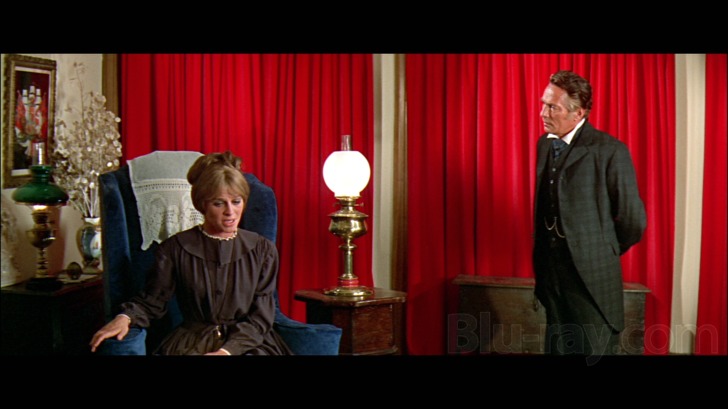
Warner's 2009 DVD contained only a trailer. WAC has added an additional extra for this Blu-ray release.
- Featurette "Location: Far from the Madding Crowd" (1080p; 1.78:1; 10:24): This promotional short filmed by MGM in 1967 emphasizes the fact that the film is being shot in the same locations about which Thomas Hardy wrote. It includes footage of Schlesinger and the cast and crew at work and a few brief snippets of an interview with Christie. The video and audio quality are only fair.
- Trailer (480i; 2.35:1, enhanced; 3:10): "In this place of calm and beauty, of deep and primitive emotions, the woman Bathsheba Everdene lived. And here she gave herself to three men." Uh, no. The fact that she did not give herself to all three is the crux of the story. The trailer's attempt to make the film sound like a soap opera suggests why the film was a commercial failure. Audiences expecting something scandalous were no doubt disappointed.
Far from the Madding Crowd Blu-ray Movie, Overall Score and Recommendation 
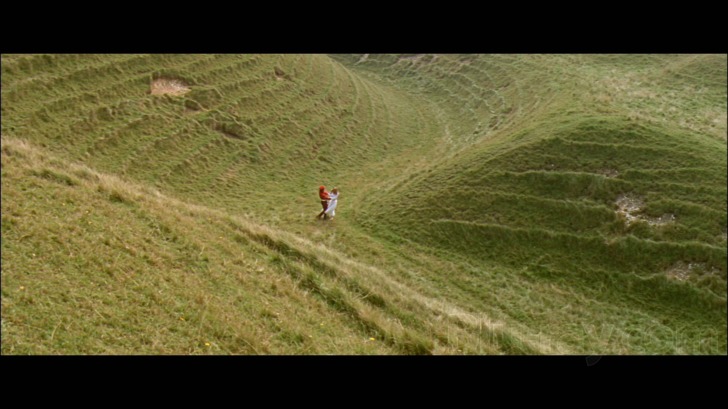
Far from the Madding Crowd is precisely the kind of film for which WAC exists. It has an A-list cast and first-rate production values, and it's so distinctive in its approach that no one could mistake it for anything resembling what has come to be known as the "Masterpiece Theater" style of adapting classic literature. Still, it never has been and never will be a film that appeals to a wide audience. A three-hour film has to earn that extended running time, and Madding Crowd fails to do so. Later this year, BBC Films is set to release director Thomas Vinterberg's attempt at dramatizing the world of Bathsheba Everdeen, and it will be interesting to see how he tackles the challenge. As for WAC's Blu-ray, its technical merits are beyond reproach (within WAC's limitations) and, on that basis, the disc is recommended.
Similar titles
Similar titles you might also like

Vanity Fair
2004

The Magnificent Ambersons
1942

Tess
1979

Love & Friendship
2016

Becky Sharp
1935

Madame Bovary
2014

Jane Eyre
2011

Bel Ami
2012

Far from the Madding Crowd
2015

Ethan Frome
1993

The Man in the Moon
1991

Washington Square
1997

A Star Is Born
Restored Edition | Warner Archive Collection
1937

A Place in the Sun
Paramount Presents #22
1951

Madame Bovary
Warner Archive Collection
1949

The Portrait of a Lady
Special Edition
1996

Some Came Running
Warner Archive Collection
1958

The Razor's Edge
Fox Studio Classics
1946

Anna Karenina
2012

Wuthering Heights
1939
